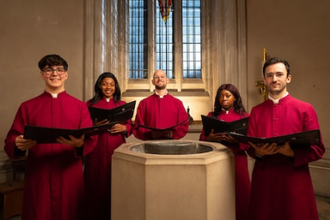Episcopal Ordination of Auxiliary Bishops for Diocese of Westminster

The Right Reverend Paul McAleenan and Right Reverend John Wilson were ordained as Auxiliary Bishops for the diocese today, the Feast of the Conversion of St Paul, 25 January 2016, at the Metropolitan Cathedral of the Most Precious in Westminster. Bishop McAleenan has been assigned the titular see of Mercia and Bishop Wilson has been assigned the titular see of Lindisfarne.
His Eminence Cardinal Vincent Nichols was the main celebrant and principal ordaining officer. He was assisted by Bishops John Sherrington and Nicholas Hudson as the principal co-consecrating bishops. The ordination was attended by His Eminence, Cardinal Cormac Murphy-O'Connor, Emeritus Archbishop of Westminster; the Most Reverend Antonio Mennini, the Apostolic Nuncio; the Most Reverend Arthur Roche, Secretary of the Congregation for Divine Worship and the Discipline of the Sacraments; as well as archbishops, bishops and nearly 200 priests from across England and Wales, particularly from the Dioceses of Westminster and Leeds; ecumenical guests representing several churches and ecclesial communities; the Lord Mayor of Westminster; and Mayors and Members of Parliament from Hertfordshire and the western London Boroughs, representing the areas of pastoral responsibility of the newly-ordained bishops.
In his homily, Cardinal Nichols focused on the lessons from the life of St Paul, on the day the Church celebrates the feast of his conversion.
He explained that 'every bishop is chosen by the Father and given to his Son to be his companion in a special way;' and that this is the 'deepest identity of the bishop: to be a 'companion, with the apostles, of the Lord Jesus'.
It is this identity that 'gives shape to the daily life of the bishop' and is 'the rock of his life'. It is this same 'bond that remains at the heart of all that St Paul is and does', in the service of the Lord.
The Cardinal also encouraged the bishops to have a 'renewed sense of mission', encouraging and developing participation with 'the missionary aspiration of reaching everyone'.
Bishop Paul McAleenan will have pastoral responsibility for the deaneries of Hertfordshire and Bishop John Wilson will have pastoral responsibility for the deaneries in the western area of the diocese.
Bishop Paul McAleenan
Prior to his episcopal ordination, Bishop McAleenan was a priest of the Diocese of Westminster for over 40 years. Born in Belfast, he trained at St Patrick's College, Thurles. He was ordained to the priesthood on 8 June 1985 and has served in various capacities throughout this time, beginning as Assistant Priest at Our Lady of Grace and St Edward in Chiswick. In 1987, he was appointed Assistant Priest at St Aidan's in Acton and Chaplain at Hammersmith Hospital. In 1990, he was appointed Assistant Stevenage Team Ministry.
He was appointed Parish Priest of St Scholastica's in Clapton in 1994, where he remained until 2001. He was then appointed Parish Priest of Holy Rood Watford. He was appointed a member of the Cathedral Chapter in 2010.
On 24 November 2015, he was appointed Auxiliary Bishop of Westminster by Pope Francis. Bishop McAleenan will have pastoral care of the deaneries of Hertfordshire.
Bishop John Wilson
Prior to his episcopal ordination, Bishop Wilson was a priest of the Diocese of Leeds. He trained at the Venerable English College and was ordained to the priesthood on 29 July 1995 by Bishop David Konstant. He was appointed Assistant Priest at St Joseph's, Pontefract in 1995, as well as hospital, hospice and school chaplain. He was appointed Assistant Priest at St Joseph's, Bradford in 1998, and also served as school chaplain.
In 1999, he was appointed Lecturer in moral theology at St Cuthbert's Seminary, Ushaw College, Durham. He also completed a PhD at Durham University and latterly served as Vice Rector. In 2005, he was appointed Episcopal Vicar for Evangelisation in the Diocese of Leeds, a role he held until 2012. From 2008 to 2014, he was sessional chaplain at HMP Leeds.
He was named a Chaplain to His Holiness by Pope Benedict XVI in May 2011. He was elected Administrator of the Diocese of Leeds by the College of Consultors during the vacancy of the see, an office which he held from September 2012 to November 2014. Most recently he served as Parish Priest of St Martin de Porres, Wakefield.
On 24 November 2015, he was appointed Auxiliary Bishop of Westminster by Pope Francis. Bishop Wilson will have pastoral care of the deaneries of the western area of the diocese.
The full text of Cardinal Nichols' homily follows:
Today we warmly welcome two new bishops into our diocesan church. What a great moment and what a blessing we are receiving, a blessing to strengthen us in so many ways.
As you so well know, the Church's storehouse is full of splendid statements about the dignity, role and vocation of the bishop. Here are just a few nuggets. The bishop as successor of the Apostles: apostle, one sent out to teach; the bishop as overseer of the diocesan Church, the original meaning of the word episcope; the bishop as a member of the College of Bishops, a sign and source of the universal nature and unity of the Church; the bishop's office rooted in the Trinitarian understanding of our entire Christian life, called by the Father, bound to the Son, filled with the Holy Spirit; the bishop with his triple tasks of prophet, priest and king, readily symbolised in the book of the Gospels held over his head, his ring of dedication and service, and his pastoral staff. There are so many rich themes for our reflection today.
But I would like to focus on just two, both of which come into sharp focus in the person of St Paul, whose conversion we celebrate today.
The first of these is that every bishop is chosen by the Father and given to his Son to be his companion in a special way. It is then the Father's will that we are here today, about to call on the Holy Spirit to transform Paul and John into chosen and loving companions of his Son in the company of the apostles. We read in the Gospel of Mark how Jesus 'summoned those he wanted.' We read, 'So they came to him and he appointed twelve; they were to be his companions' (Mk 3.14).
Here we have the deepest identity of the bishop: companions, with the apostles, of the Lord Jesus. It is this that gives shape to the daily life of the bishop, striving above all to stay close to the Lord in the midst of all the demands made upon him. This relationship is the rock of his life. Without it we bishops lose our focus and our true sense of purpose. We can so easily become functionaries of a demanding service provider. But that is not the life of the Church, even if at times it might seem so! Indeed, that particular roadblock is only avoided when every one of us, parishioners, priests, religious, bishops, is rooted in the life of Christ and sees our Church as a sharing in that life, held together by him and serving him alone.
The conversion of St Paul, with its drama, starts with this same point. Saul heard the powerful voice, rebuking him. Then he asked the fateful question: 'Who are you?' Once the answer was given, 'l am Jesus of Nazareth and you are persecuting me', a new world opened up for Paul. Immediately he replies 'What am I to do?' His bond with the Lord is sealed and his vocation begins to unfold. (Acts 22: 3-16).
It is this bond that remains at the heart of all that St Paul is and does. He rejoices in his weaknesses, because then his reliance on the Lord is made clearer. He embraces his sufferings with a realisation that they bring him closer to his Lord. His whole spiritual life is summed up in the words of St John Chrysostom, which we read in this morning's Office:
'The most important thing of all to him, however, was that he knew himself to be loved by Christ. Enjoying this love, he considered himself happier than anyone else; were he without it, it would be no satisfaction to be the friends of principalities and powers. He offered to be thus loved and be the least of all, or even to be among the damned, than to be without that love and be with the great and honoured.' (Homily 2 on St Paul).
I pray that we bishops, and indeed every one of us, can be the same. As we strive to imitate St Paul, especially as bishops, co-apostles with him, let us remember that in our life there can be no place for high horses (Paul had to come off his), for prestige, or for love of the footlights. With Paul, who faced the criticism of being ambitious, the only thing we are to boast about is the Lord and the joy and consolation of knowing him and of preaching his Gospel (1 Cor 1.31).
Now the second facet of the life of a bishop, on which you, Paul and John, both embark today, is also contained in that line from St Mark's Gospel and in the life of St Paul. Jesus chose the twelve 'to be his companions and to be sent out to preach.' Today's Gospel passage gives this same command: 'Go out to the whole world; proclaim the Good News to all creation' (Mk 16.15). St Paul lived that mission with every fibre of his being. He sets the standard.
A renewed sense of mission is central to the Church today, and indeed central to the life of our diocese. Pope Francis spells out this task repeatedly. He asks us 'to put all things into this missionary key' (Evangelii Gaudium 34) and seeing the parish not 'as an outdated institution' but as 'the presence of Christ in a given territory', as 'the Church living in the midst of the homes of her sons and daughters.' He describes the parish as 'a community of communities, a sanctuary where the thirsty come to drink in the midst of their journey and a centre of constant missionary outreach' (EG28).
This is our direction, spurred on by our diocesan Proclaim process, already well underway in so many parishes. Proclaim the Gospel; in particular Proclaim Mercy, in this year of such grace. And this is our direction as bishops, too. As Pope Francis writes:
'The bishop must always foster this missionary communion in his diocesan Church... to do so he will sometimes go before his people, pointing the way and keeping their hopes vibrant. At other times, he will simply be in their midst with his unassuming and merciful presence. At yet other times, he will have to walk after them, helping those who lag behind and, above all, allowing the flock to strike out on new paths. In his mission of fostering a dynamic, open and missionary communion, he will have to encourage and develop the means of participation... with the principal aim not of ecclesiastical organisation but rather the missionary aspiration of reaching everyone.' (EG 31). And today we add, reaching everyone with the message of God's mercy.
This then is our mandate and our pathway. This is the shape of our episcopal ministry, or at least the shape to which we aspire: two Johns, Nicholas, Paul and Vincent. To this journey you, Paul and John are most welcome. You can be sure of that. You can be sure of the loving prayers and support of all the priests and people of this great diocese. We thank God for you, even as we now beseech him to grant to you a full measure of his Holy Spirit, marking you forever as his apostles, his bishops, whose lives will now be to his praise in this new and blessed ministry.
Let us now proceed.
X Cardinal Vincent Nichols
Archbishop of Westminster


















